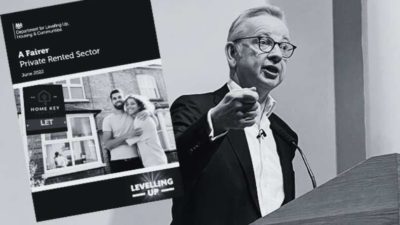Climate change is an issue that every industry faces, and a problem that each must adapt to.
The property market is a prime example. Residential real estate accounts for 40% of the UK’s carbon emissions, and is increasingly subject to government regulations that will instigate a faster shift towards sustainability.
As of April 2025, changing Energy Performance Certificate (EPC) ratings will require almost three in five homes (58%) to improve their energy efficiency if they are to be let as a private rental.
And with a fine of £30,000 for non-compliance, many landlords will need to invest – potentially quite significantly – in their properties to make the necessary renovations.
However, these renovations should be treated as an opportunity, rather than a legal requirement.
Indeed, as 42% of renters say they consider the environmental impact of a property before renting, and 82% of buyers say they would pay more for an energy efficient home, landlords have the chance in coming years to simultaneously combat the effects of climate change and enhance the marketability of their properties as well.
With this in mind, what do landlords need to know about upcoming regulations, and how can lenders support them to increase the overall sustainability of the property market?
Upcoming regulations
As noted above, the new regulations will tackle the energy efficiency of homes in the private rental sector. On a scale of A to G, with A being the most efficient, rented homes will have to qualify for an EPC rating of C or above.
Currently, the minimum rating is E; 12.6 million properties across the UK have a rating of D or lower, meaning a sizeable number of landlords will need to act. So, where can energy efficiency be improved?
Insulation
Improving the insulation of walls alone can decrease energy usage to heat and cool a property by 25%, with this number growing when the property is fitted with more efficient windows.
As such, landlords can expect to pay less in maintenance costs, as the property will be less susceptible to mould.
This area of renovation is likely to put the most pressure on a landlord’s finances.
However, increasing the insulation of a property will cut energy costs; this ought to make it easier to attract and retain tenants. Encouragingly, 18% of renters say they would pay more rent if new windows were installed.
Paired with the estimated premium of £40,000 that homes with sustainable features sell with, it is clear that landlords should expect to increase their profits by renovating their properties insulation.
On top of this, the Chancellor Rishi Sunak confirmed in the Spring Statement on 23 March that VAT will be reduced on energy saving materials (like solar panels, heat pumps and insulation) to 0% for the next five years.
As such, this area of renovation is likely to become much cheaper, increasing profit margins even further.
Electricity usage
Simpler changes to make include replacing lightbulbs and upgrading boilers.
Upgrading from old, inefficient boilers to new condensing boilers can increase efficiency by an estimated 34% and can reduce a tenant’s fuel bill by around 30%.
Indeed, 15% of renters would pay more rent if an efficient boiler and heating system was installed, and as condensing boilers become the norm, spare parts and repairs for old boilers will likely become much more expensive.
Similarly, replacing old lightbulbs with new Energy Star LEDs will reduce electricity consumption by 75%, and they will last for 25 times longer.
As such, landlords can reduce maintenance costs and tenant energy bills by replacing old lightbulbs and boilers, resulting in greater profitability for their property in the long run and, hopefully, happier tenants.
Potential obstacles
But there are issues to be addressed. The Association of Residential Letting Agents believe that the cost of renovations, paired with the proliferation of ‘green’ finance, could price some landlords out of the market – resulting in ‘eco-privilege’.
For affluent landlords, expensive renovation projects might not significantly impact their finances and could benefit them in the long run as they access favourable ‘green’ mortgage rates.
As such, their properties will cost less to heat and maintain as a result of their upfront investments.
However, for landlords who cannot pay to renovate outright, they might not be able to access ‘green’ finance and will perpetually pay less favourable mortgage rates.
Consequently, an already troubling affordability crisis could become a lot more difficult to navigate for less affluent landlords or prospective buyers.
As the new EPC regulation deadline approaches in 2025, some market commentators have suggested that thousands of landlords will opt to sell their properties rather than make the necessary changes, which could be too costly.
Assistance is needed for those who would fall into this group.
How lenders can help
As with any new market trend, educating landlords on their options is key.
Through consultation with their lender, landlords should come up with a carefully considered timeframe that will spread the cost of renovations out across the next few years in the lead up to the regulatory changes.
This should enable less affluent landlords to renovate within their means.
Certainly, lenders with expertise and experience should be on hand to facilitate a wider range of landlords to invest in energy efficient features for their properties.
In this function, the bridging loan sector can act as a remedy to ‘eco-privilege’.
For example, perhaps a landlord has bought a property at auction and needs to finance both the purchase and a refurbishment project, or a pre-existing landlord needs to free up capital to make the renovations.
Bridging lenders can, as the name implies, help landlords bridge the gap between the commencement of an efficiency improvement project and the sourcing of a long-term ‘green’ finance solution.
As such, the fairness of the market will remain intact, as more landlords will be empowered to access favourable mortgage rates.
As the climate crisis develops, it is vital that landlords and lenders work together to make the property market more sustainable.
That said, this should not be at the expense of market equity and the benefits of sustainability must not fall to only the most affluent.
If managed successfully, increasing energy efficiency will benefit both the planet and the property market, creating a more sustainable future for all involved.
Author: Paresh Raja is the founder and CEO of Market Financial Solutions (MFS), a London-based specialist lender that provides bridging loans and buy-to-let mortgages. Prior to establishing MFS in 2006, Paresh worked as a senior professional consultant in one of the top five management consultancy firms, and also set up an independent investment group.

























Comments